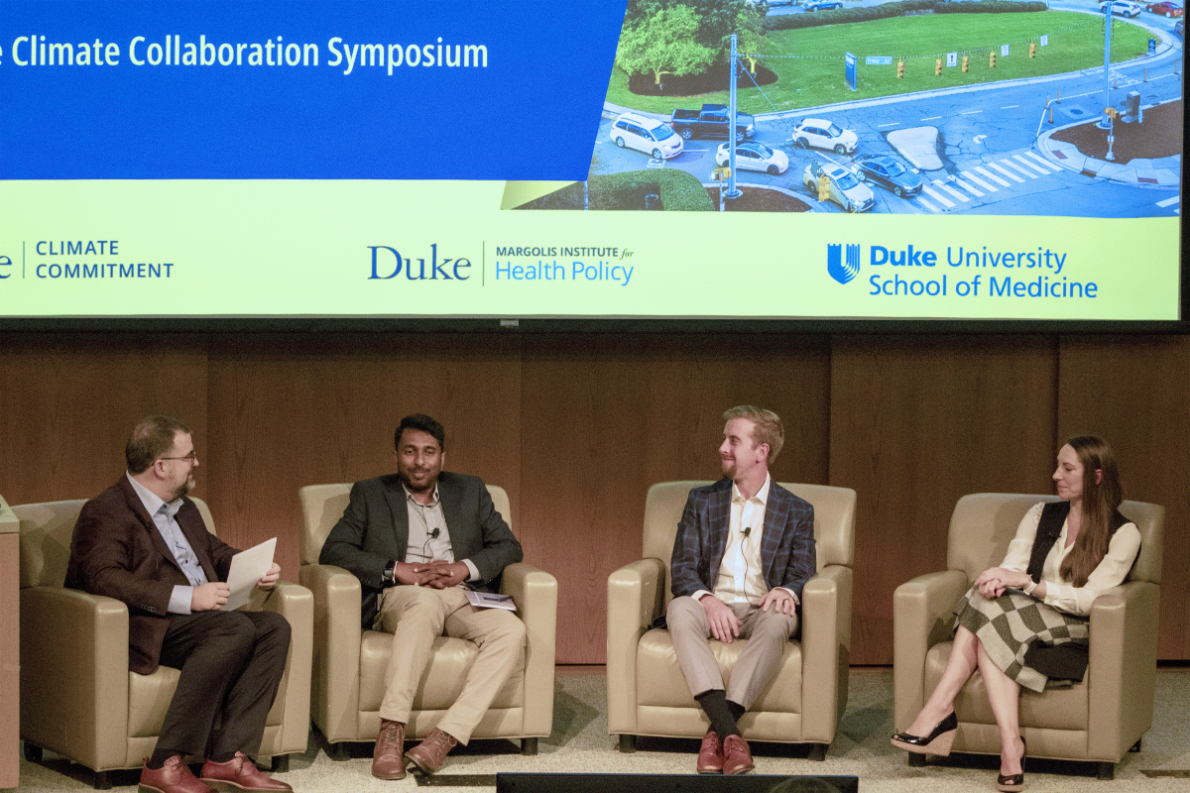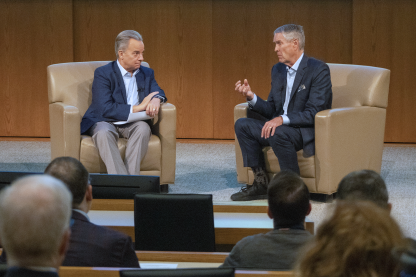
Health and climate are deeply intertwined. Both are central to families, communities, and economies. Yet, both are under pressure. Climate change is intensifying health challenges, from heat-related illness to food insecurity, while the health care sector itself contributes significantly to greenhouse gas emissions.
Can the future of health care reform also be a future of climate resilience—one that makes health care more sustainable, affordable, and accessible while reducing its environmental impact?
That question framed the discussion at the Duke Climate Collaboration Symposium on Oct. 1, 2025, co-hosted by the Duke-Margolis Institute for Health Policy and the Duke University School of Medicine. The event convened leaders across disciplines to explore how the health care landscape can adapt and lead in the face of a changing climate.
A Call to Connect Health Reform and Climate Action
“The evidence is clear that our climate is changing; we can see it in front of our eyes,” said Robert Tighe, associate professor of medicine and director of the School of Medicine’s Climate and Health Research Initiative, in opening the symposium. “We’re already seeing effects, such as prolonged heat waves, increased wildfires, worsening droughts, more severe storms and even hurricanes reaching the mountains of North Carolina, where we don’t normally expect them.”
These environmental changes, Tighe said, are not just environmental issues. They are public health emergencies that threaten nutrition, exacerbate chronic conditions and strain already burdened health systems.
“Climate change, in the end, is a threat to us and our health,” Tighe said. “To protect the communities we serve, we need to consider how climate change creates health threats and identify opportunities to mitigate or prevent them. But these challenges are unfolding at a time when health systems are already financially stretched. This is an incredibly complex problem that will require diverse expertise, new data, creative policies and coordinated action.”
Throughout the day, symposium participants explored how health reform can deliver multiple “co-benefits”: healthier patients and communities, more resilient health systems, and a reduced environmental footprint. Panels highlighted how climate-driven crises—from extreme weather to supply chain disruptions—directly impact patients’ access to care and community wellbeing.
“The more sustainably we can deliver health care from an environmental standpoint, the better for health,” said Mark McClellan, director of Duke-Margolis.

Policy Leadership and Personal Experience
In a fireside chat keynote, former Senate Majority Leader Bill Frist—a longtime physician and chair of The Nature Conservancy’s Global Board of Directors—joined McClellan to discuss policy opportunities at the intersection of climate change and health reform. Frist reflected on how his medical background and environmental leadership shaped his belief that climate and health policy must be aligned, and how innovation is key.
“Innovation, to me, is taking the best of the private sector, the best of the public sector, the best of academia, and the best of the community—and putting it together,” he said.
Their conversation underscored how effective reform will depend on cooperation across sectors and the translation of research into actionable policy—the focus of additional panels during the event.
Later in the day, health care leaders from Western North Carolina shared firsthand lessons from their response to Hurricane Helene, which struck the region in September 2024. Their stories illustrated how proactively built health care infrastructure, community networks, and data-driven planning can strengthen resilience in the face of local health threats brought about by climate-driven disasters.
Their experiences echoed an overall key theme of the symposium: that sustainable, climate-ready health systems depend on collaboration—between hospitals, local governments, community organizations and patients themselves.
Putting People at the Center
During the interactive lunch session, participants discussed how to frame sustainability and climate readiness in ways that resonate with patients and communities.
“There are a lot of people here at Duke who are working on ideas that can help address exactly the problems we’re talking about,” McClellan said. “It’s not just the physician—it’s the community health worker, the data scientist, the local leader—all working together to identify people at risk, inform them, and support evidence-based action to reduce those risks.”
The symposium concluded with a closing discussion between McClellan; Frist; Jonathan Perlin, President and CEO of the Joint Commission; and Victor Dzau, president of the National Academy of Medicine. Dzau underscored the urgency of integrating climate considerations into every aspect of health policy and care delivery.
“If you look at climate change, how it’s impacting public health, health care, and of course, how it’s impacting our health care delivery system, and how we are contributing to carbon emissions, we have to do something about this. The future is here,” Dzau said. “Every sector needs to put health in the center. These issues tend to be a little abstract when we think about climate and environment until you see the wildfires and the hurricanes. But if you put people in the middle of this, that, to me, is the key.”
Throughout the symposium, experts emphasized that effective solutions must be scientifically grounded, person-centered, and multi-faceted to address local health priorities. Sustainable care delivery, they noted, is not only about reducing emissions—it’s about improving population health, building equity, and ensuring that communities can thrive despite climate challenges.
The symposium was the fourth of the Duke Climate Collaboration Symposia, a series of convenings designed to accelerate climate solutions by developing new collaborations among Duke scholars and external partners. Each symposium focuses on identifying opportunities for Duke University to make the most of its interdisciplinary expertise and convening power for meaningful impact on climate challenges.
The series is funded by a gift from The Duke Endowment in support of the Duke Climate Commitment, which unites the university’s education, research, operations, and public service missions to address climate challenges. The Nicholas Institute for Energy, Environment & Sustainability manages the symposia series.
Photographs by Weiyee Mock